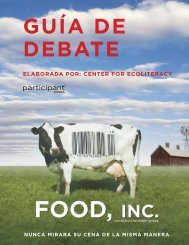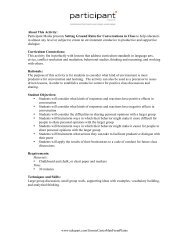Food Inc. Discussion - TakePart
Food Inc. Discussion - TakePart
Food Inc. Discussion - TakePart
Create successful ePaper yourself
Turn your PDF publications into a flip-book with our unique Google optimized e-Paper software.
People can become infected with E. coli by consuming foods or beverages that<br />
have been contaminated with animal manure, particularly cattle manure. One<br />
of the most deadly strains, known as E. coli O157:H7, was first found in 1982<br />
and has been traced to ground beef, sausages, unpasteurized milk and cheese,<br />
unpasteurized apple and orange juice, alfalfa and radish sprouts, lettuce, spinach,<br />
and drinking water. Recent research indicates that an increased presence of<br />
E. coli in cows’ guts may be the result of their high-corn diet, which favors<br />
acid-resistant bacteria strains like E. coli O157:H7.<br />
Numerous federal agencies are responsible for food safety and inspection in<br />
the United States, including the U.S. Department of Agriculture (USDA), the<br />
<strong>Food</strong> and Drug Administration (FDA), and others. However, no one agency is<br />
responsible for all foods, and agencies may split responsibility for even the same<br />
food product. With frozen pizzas, for example, the cheese is regulated by the<br />
FDA and the pepperoni by the USDA. One drawback with this system is that<br />
potential problems can slip through the cracks. Another is that each agency has<br />
competing priorities for funding and staffing. At the FDA, for example, most of<br />
the budget funds drug regulation—not food inspection—and at the USDA, there is<br />
a chronic shortage of meat inspectors.<br />
A wave of recent food recalls is an indication of the inadequacy of our food<br />
safety system. A recall is when consumers are asked to return potentially unsafe<br />
products for refund and usually results from an outbreak of illness. While recalls<br />
do control the immediate spread of the illness, they also underscore a systemic<br />
lack of prevention strategies.<br />
As depicted in the film, the fragmentation of our food safety system can lead<br />
to tragic results. Barbara Kowalcyk and Patricia Buck, Kevin’s mother and<br />
grandmother, have worked for years to pass the Meat and Poultry Pathogen<br />
Reduction and Enforcement Act, or “Kevin’s Law.” This bipartisan bill was<br />
designed to increase the USDA’s authority to set and enforce food safety<br />
standards for meat and poultry. For example, if a meatpacking plant were to<br />
repeatedly fail contaminant tests, the USDA could shut it down.<br />
Some people say that regulations like Kevin’s Law would keep consumers<br />
safer. However, others argue that such regulations are impractical and based<br />
4 0<br />
F o o d , I n c . D I S C U S S I O N G U I D E © P a r t I C I P a N t M E D I a









